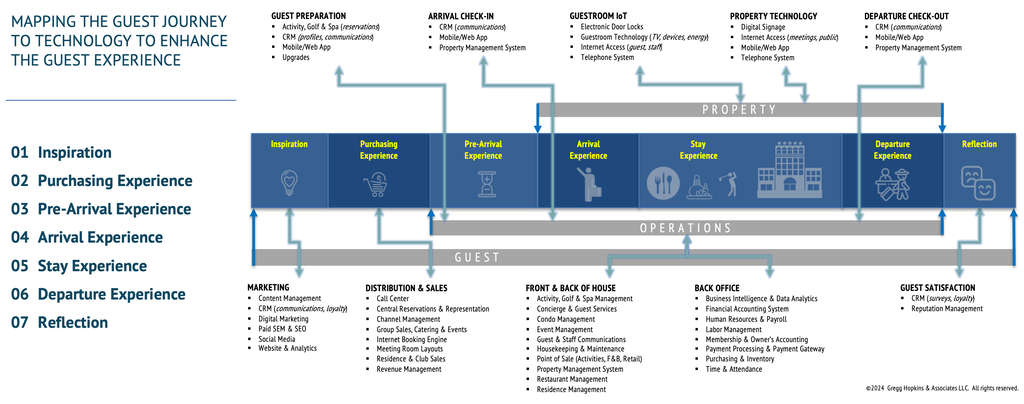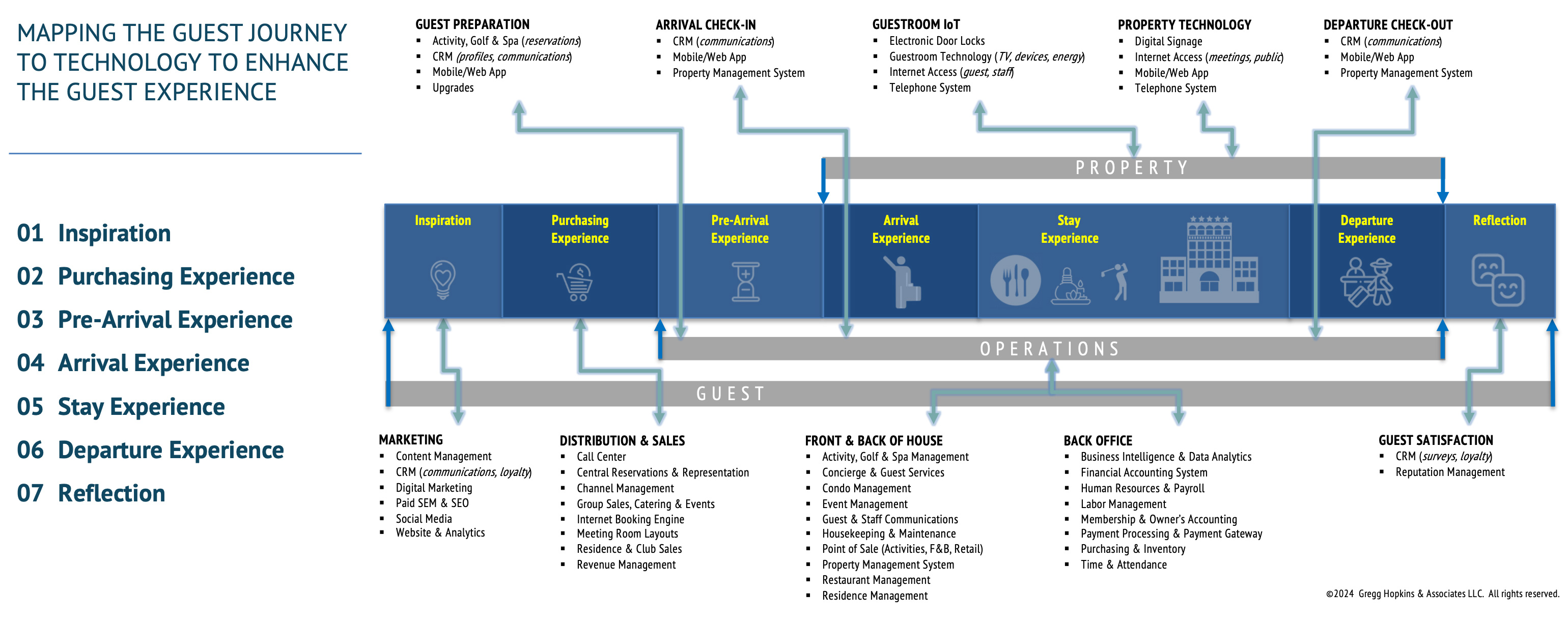Revolutionizing the Guest Journey: Purchasing Experience
An effective hospitality technology stack should focus on the following seven (7) core areas of the guest journey while delivering a “data process flow” to facilitate the required operational capabilities that aligns with the hospitality provider’s desired guest experience with consideration for future requirements:
Today, we turn our attention to the “Purchasing Experience” stage of the guest journey. Once your guest has decided they want to visit your hotel they want to book their trip quickly and easily. Having a smooth, simple booking experience, including website navigation and payment processes, will give a great first impression to guests and add to the overall guest experience. At this stage, guests also appreciate timely responses to queries and further inspiration for their upcoming trip.
The way people think about travel is fundamentally different than even 10 years ago. Increasing numbers of travelers want to book their trips online. The emerging Gen Z and Millennial traveler markets make decisions based on ratings and reviews, recommendations from influencers, and whether or not the destination is “Instagrammable”. Another key factor is flexibility with more frequent last-minute travel plan changes is more important than ever.
Nearly two-thirds of total hotel chain revenue is now booked online. Online travel agencies (indirect third-party) still account for most of that, but direct bookings via the hotel’s Internet Booking Engine (“IBE”) are catching up.
According to PhocusWire, bookings through OTAs were down from 39% in 2022 to 34% in 2023, while direct bookings increased from 20% to 29% over the same period. The biggest decrease came in offline bookings, which accounted for barely one-fourth of overall bookings in 2023, down from one-third the prior year. PhocusWire credited “this amazing result” in part to “quality content on brand websites, loyalty offers and an increasing customer focus using smart and agile systems”.
The advisory firm h2c reported in their 2023 Global Hospitality Distribution Survey that “record online direct bookings are driving innovation as guest data becomes more accessible through a growing base of loyal customers who are either enrolled in loyalty or instant gratification membership programs. Data-driven customer insights are strongly supported by hotel chains’ mobile websites and proprietary apps, multiplying service and sales opportunities. While CRM systems were used by only 54% of respondents in h2c’s Global Hospitality Distribution Study in 2022, the share has grown to 76%, making it an essential tool for customer success.”
System integration remains the biggest challenge in digitizing operations. While revenue-generating systems, such as the Internet Booking Engine )”IBE”), have reached a high level of integration, more operations-related systems, such as spa, golf, and other service management systems, have the lowest level of integration”. Without integration to these systems, it makes it very difficult to sell a complete offering to guests or dynamic packaging to include room plus golf for one price. The traditional booking process of selling the room first and then offering ancillary services should be redesigned to allow the guest to review and then book according to their priorities. For example, why would I want to stay at your resort if there are no tee times available during my stay?
Hoteliers wanting to stand out need to be aware of the following:
- Travelers often seek out specific data: helpful content that speaks to different questions and touchpoints, hoteliers can ensure online viewers find critical answers quickly—and on their site.
- Omnichannel experience: it’s critical to create a consistent experience with similar content on every platform.
- Personalization and localization: tailoring content to specific audience needs and engaging with your audience, you can deliver a personalized experience.
- Influencer marketing and expert community building: people make more bookings based on recommendations from online influencers, so hoteliers should court influencers and their followers with high-quality, visual content.
Useful tools for the Hotels at the Purchasing Stage (in addition to the Internet Booking Engine mentioned above):
- Connecting your Customer Relationship Management system to power website IBE and Call Center to deliver personalization and consistent service to loyal customers.
- As mentioned previously, approximately 25% of bookings are offline. An effective Call Center System is still an important component of the technology stack. While humans are still best suited for call center operations, further adoption of artificial intelligence (“AI”) in call centers will help automate time-consuming tasks, improve performance, and provide better customer experiences. Instead of waiting in an endless queue, customers can get an answer or a solution faster and easier with AI-powered chatbots. You can also provide targeted recommendations that are tailored to each customer's needs by utilizing AI technology.
- Central Reservation Systems gives hoteliers access to different booking channels, including the global distribution system (GDS) agency market and Internet booking websites. While a hotel technology provider gives you access to the channels you need, it does not provide you with help on how to best use these channels to optimize your distribution strategy. Using booking channels in the correct way to support your individual business needs can be a complex and time-consuming job. This is where a Hotel Representation Company comes in. A Hotel Representation Company aids with your distribution strategy to ensure you receive as many reservations as possible, at a good rate, and at an attractive cost of sale. A Hotel Representation Company can also add real and measurable value to your hotel’s business through different demand generation activities.
- A Channel Manager that allows hoteliers and property managers to update multiple online booking sites automatically every time a change in availability, pricing, or stay restriction occurs.
- Group Sales, Catering and Events system to enable effective management and booking of group business including capabilities to receive requests for proposals and event bookings via the hotel’s IBE.
- Strategic distribution and pricing tactics used to sell perishable room inventory to the right guests at the right time to boost revenue growth via an integrated Revenue Management System with all booking channels.
Interested in learning more? This article is the third in a series on the technology components in each of the seven (7) phases of the guest journey. Be sure to follow Get Hoppy Consulting on LinkedIn for updates or email me at [email protected] to discuss your organization’s tech.

